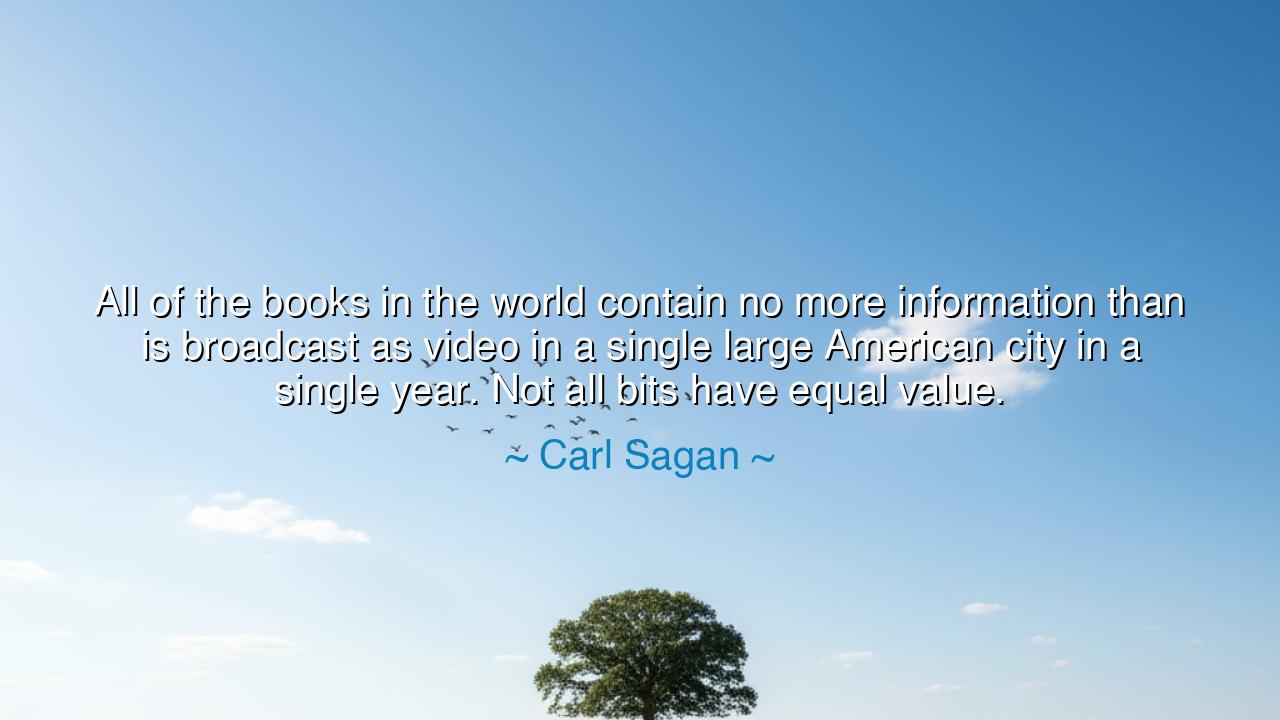
All of the books in the world contain no more information than
All of the books in the world contain no more information than is broadcast as video in a single large American city in a single year. Not all bits have equal value.






Hear now the wisdom of Carl Sagan, that modern prophet of the stars, who said: “All of the books in the world contain no more information than is broadcast as video in a single large American city in a single year. Not all bits have equal value.” At first, these words sound like a marvel, a celebration of the vastness of our age. Yet they are not triumph only—they are warning, wrapped in metaphor, teaching us that abundance is not the same as wisdom, and that sheer volume of information does not equal depth of truth.
For in the ancient days, when scrolls were rare and libraries sacred, knowledge was precious. The Library of Alexandria was revered because within its walls lay the collective wisdom of the world, painstakingly gathered, copied, and preserved. A single book could alter kingdoms, inspire faiths, or change the course of history. But in our age, where video floods every screen and voices pour endlessly from the air, the challenge is no longer scarcity of knowledge—it is the drowning flood of bits, many of them empty, shallow, or false.
Sagan’s words remind us that not all bits have equal value. A million flashing images may not hold the worth of a single thoughtful sentence. A year’s worth of television, advertisements, and entertainment may exceed in sheer size all the volumes of the ancients, yet within those billions of bytes, how much truly teaches, uplifts, or endures? One line of Shakespeare, one law of Newton, one teaching of the Buddha carries more weight than endless hours of empty chatter. The measure of knowledge is not in its quantity, but in its power to shape the soul and illuminate the mind.
Consider the example of Johannes Gutenberg’s press, which poured forth books faster than any scribe could copy. With this came both the Reformation and the flood of pamphlets, both enlightenment and propaganda. So too with the television and internet of Sagan’s age: they carry both the cure and the poison, the spark of discovery and the mire of distraction. Thus, his warning is clear—our task is not merely to receive, but to discern, to separate the gold from the dross.
The danger of forgetting this truth is plain in history. In Rome’s later days, the people were fed endless spectacle—bread and circuses—while the wisdom of governance faltered. They consumed much, but learned little. Their appetite for entertainment outweighed their hunger for knowledge, and the empire, mighty as it was, decayed from within. In this way, Sagan cautions us: when we confuse the abundance of bits with the richness of wisdom, we risk losing the very foundation of civilization.
But take hope, O seeker, for the remedy lies within your grasp. You cannot silence the flood of information, but you can choose what you drink from it. You can turn from noise to meaning, from distraction to insight. You can weigh each word, each image, each idea, and ask: does this endure? Does this deepen my mind, enlarge my spirit, or serve the greater good? If the answer is no, then pass it by, as the wise pass by the glittering stone to find the true jewel.
Practical steps follow: read books that have stood the test of time, for they carry weight beyond the moment. Use technology not as a master, but as a servant, seeking voices that teach, not merely entertain. When faced with an endless sea of content, train your mind to pause, reflect, and choose. And above all, remember that wisdom is not measured in bytes, but in the transformation of the heart.
Thus, let Sagan’s words guide you: “Not all bits have equal value.” The world may flood you with video, with chatter, with endless streams of images, but one drop of truth outweighs oceans of noise. Seek the drop. Treasure it. Live by it. For in the end, civilizations are not built by the flood of information, but by the rare jewels of wisdom hidden within it.






AAdministratorAdministrator
Welcome, honored guests. Please leave a comment, we will respond soon